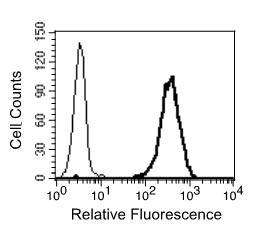Anti-CEACAM1/3/5/6 (CD66a/d/e/c) [D2-4H] monoclonal antibody
Invented by Dr Bernhard B. Singer from LeukoCom
Invented at LeukoCom
- Datasheet
- References (5)
- Inventor Info
Info
| Catalogue Number | 154000 |
| Applications | ELISA FACS IHC IP WB |
| Antigen/Gene or Protein Targets | Human CEACAM 1, 3, 4, 6 |
| Reactivity | Human |
| Host | Mouse |
| Immunogen | Human CEA derivative |
| Subclass | IgG1 kappa |
| Myeloma Used | NS1/0 |
| Notes |
CEA-related cell adhesion molecules (CEACAMs) are members of the carcinoembryonic antigen (CEA) gene family, which belongs to the immunoglobulin superfamily. All CEACAMs are heavily glycosylated. The CEACAM subgroup in humans consists of 12 members composed of a single immunoglobulin variable (IgV)-like N-terminal (N) domain followed by zero to six Ig constant (IgC)-like domains of A and B subtypes and one member which consists of two IgC-like domains and two IgV-like domains, one at each end of the molecule. CEACAMs show a very heterogeneous expression pattern and can be expressed in several leukocyte-subtypes, most epithelia and endothelia. As their expression pattern, CEACAM mediated functions are very heterogeneous and range from cell-cell communication, proliferation, apoptosis to differentiation and contact-inhibition. Most CEACAMs also serve as pathogen receptors. |
| Research Area | Cancer, Immunology |
References: 5 entries
1.) Singer B.B.: CEACAMs. Encyclopedia of Signaling Molecules. 2016.
Javaheri et al. 2016. Nat Microbiol. 2:16189. PMID: 27748768.
Helicobacter pylori adhesin HopQ engages in a virulence-enhancing interaction with human CEACAMs.
Europe PMC ID: 27748768
Beauchemin et al. 2013. Cancer Metastasis Rev. 32(3-4):643-71. PMID: 23903773.
Carcinoembryonic antigen-related cell adhesion molecules (CEACAMs) in cancer progression and metastasis.
Europe PMC ID: 23903773
Add a reference
References: 5 entries
1.) Singer B.B.: CEACAMs. Encyclopedia of Signaling Molecules. 2016.
Javaheri et al. 2016. Nat Microbiol. 2:16189. PMID: 27748768.
Helicobacter pylori adhesin HopQ engages in a virulence-enhancing interaction with human CEACAMs.
Beauchemin et al. 2013. Cancer Metastasis Rev. 32(3-4):643-71. PMID: 23903773.
Carcinoembryonic antigen-related cell adhesion molecules (CEACAMs) in cancer progression and metastasis.
Add a reference






![Image thumbnail for Anti-CEACAM1/3/5/6 (CD66a/d/e/c) [D2-4H] monoclonal antibody](https://res.cloudinary.com/ximbio/image/upload/c_fit,fl_lossy,q_auto/cb0d60d5-7ec1-41b6-8c97-fc9e2f2d275e.png)
![Image thumbnail for Anti-CEACAM1/3/5/6 (CD66a/d/e/c) [D2-4H] monoclonal antibody](https://res.cloudinary.com/ximbio/image/upload/c_fit,fl_lossy,q_auto/75b55e44-f17d-427f-9751-7b51448f578c.png)
![Image thumbnail for Anti-CEACAM1/3/5/6 (CD66a/d/e/c) [D2-4H] monoclonal antibody](https://res.cloudinary.com/ximbio/image/upload/c_fit,fl_lossy,q_auto/d0062c38-6001-42df-b4f3-8e90acf42571.png)
![Image thumbnail for Anti-CEACAM1/3/5/6 (CD66a/d/e/c) [D2-4H] monoclonal antibody](https://res.cloudinary.com/ximbio/image/upload/c_fit,fl_lossy,q_auto/60756f4e-2f12-472a-9cf4-cadb11bb74f8.png)
![Image thumbnail for Anti-CEACAM1/3/5/6 (CD66a/d/e/c) [D2-4H] monoclonal antibody](https://res.cloudinary.com/ximbio/image/upload/c_fit,fl_lossy,h_45,q_auto/cb0d60d5-7ec1-41b6-8c97-fc9e2f2d275e.png)
![Image thumbnail for Anti-CEACAM1/3/5/6 (CD66a/d/e/c) [D2-4H] monoclonal antibody](https://res.cloudinary.com/ximbio/image/upload/c_fit,fl_lossy,h_45,q_auto/75b55e44-f17d-427f-9751-7b51448f578c.png)
![Image thumbnail for Anti-CEACAM1/3/5/6 (CD66a/d/e/c) [D2-4H] monoclonal antibody](https://res.cloudinary.com/ximbio/image/upload/c_fit,fl_lossy,h_45,q_auto/d0062c38-6001-42df-b4f3-8e90acf42571.png)
![Image thumbnail for Anti-CEACAM1/3/5/6 (CD66a/d/e/c) [D2-4H] monoclonal antibody](https://res.cloudinary.com/ximbio/image/upload/c_fit,fl_lossy,h_45,q_auto/60756f4e-2f12-472a-9cf4-cadb11bb74f8.png)

